选修六unit4reading
- 格式:ppt
- 大小:3.16 MB
- 文档页数:67
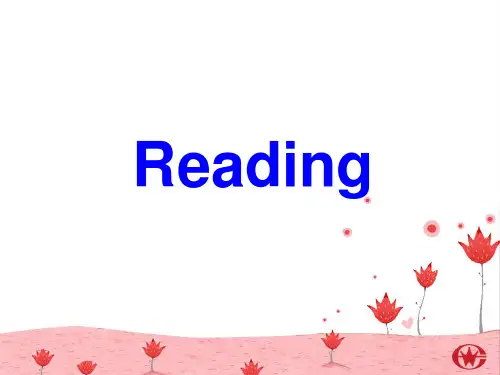
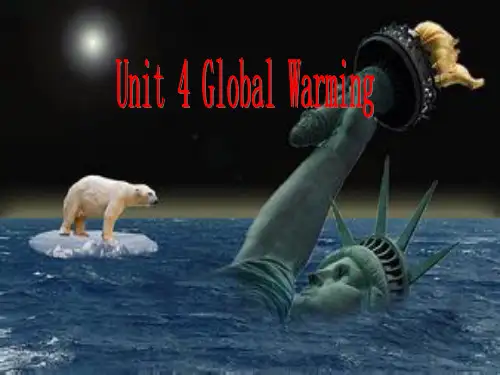

Book6 Unit4 Global warming 导学案(Period One: Reading)课前案Skim the text and finish the following information.1.What’s the main topic of the passage?The main topic of the passage is about .2.Who wrote the magazine article? What is the name of the magazine?wrote the magazine article; the name of the magazine is .3.What are the names of the three scientists mentioned in the article?The names of the three scientists mentioned in the article are , , and .Do they agree with one another? .4.The passage can be divided into three sections, match them with the main idea of each section.Part1.(1) A. How global warming comes aboutPart2. (2-5) B. List two different attitudes towards global warmingPart3. (6) C. Introduction of global warmingPart4. (7) D. Whether people should do something about global warming课中案学习目标:1.To learn some important words and phrases about global warming.2.To develop the reading skills by skimming and scanning the passage.3.To strengthen the awareness of environment protection .Step 1 Fast readingRead the text quickly and choose the best answers.1. How much did the temperature rise in the 1900s?A.One degree Fahrenheit. B.One Celsius.C.Two degrees. D.Thirty degrees Celsius.2.What causes the earth’s temperature increasing?A. Cutting treesB. Wasting the farmland.C. Running out of the river waterD. Burning fossil fuels.3.Which of the following is Dr. Janice F oster’s opinion?A. The result of the temperature increase will be serious.B. The amount of warming is nothing serious.C. We needn’t worry about high levels of carbon dioxide.D. Global warming is a natural phenomenon.4.According to George Hambley, .A. Global warming is a serious problem.B. There is no need to worry about global warming.C. The levels of CO2 in the air will become lower in the future.D. More animals will make greenhouse gases decrease.5. We can infer from the text that __________.A. the debate about the effects of global warming has not been settled.B. the greenhouse effect is the result of people’s actions.C. all scientists think it is important to reduce the amount of CO2 in the atmosphere.D. reducing greenhouse gases will immediately decrease the earth’s temperature. Step2 Careful reading Read Para.2 to Para.6 and fill in the blanks.(Para.2-Para.3)The reasons for global warminggreenhouse gases(Para.4-Para.5)The levels of carbon dioxide have increased greatly over the last . According to Dr.Charles Keeling, from to , the amount in the atmosphere wentup from around parts to around parts per millionDr.Janice Foster believes over the next century ,the amount of warming could be as lowas degrees Celsius, but it could also be as high as degrees.(Para.6)Different opinions about global warming.Dr. Foster(a catastrophe)George Hambley(a positive thing)1.a rise in2.severe storms, __________,__________, famines3.the spread of4.the disappearance of1.Plants will2.Crops will3.There will be a greater rangeofStep3 Further reading True or False()1.The temperature in the last century seemed to increase much.()2. Everyone believes that global warming is caused by the activities of humans.()3. The rise in carbon dioxide is causing a steady increase in global warming.()4. George Hambley believes that global warming will do good rather than harm to the earth.()5. It is clear what the effects of global warming will be.Step 4 Fill in the blanks to retell the passage.The temperature of the earth 1 (rise) about one degree during the 20th century. How has this come 2 ? All scientists subscribe 3 the view that it is human activity 4 has caused the 5 (globe) warming rather 6 a random but natural phenomenon. Some scientists think we add large 7 (quantity) of carbon dioxide to the air. Some scientists believe the burning of more and more fossil fuels 8 (have) resulted in the increase of carbon dioxide. Greenhouse gases continue to build 9 . It may be a catastrophe but George 10 (state) that it is a positive thing.Step 5 Free talk — a short speech 能力提升Between the two opinions ,decide on one to have a discussion in you group and then choose a speaker to give a speech on behalf of your group. The following information may help you.Step 6 Summary课后案I.课外延伸阅读Further reading about global WarmingGlobal warming is the unusually rapid increase in Earth’s average surface temperature ove century primarily due to the greenhouse gases released as people burn fossil fuels. The global averagesurface temperature rose 0.6 to 0.9 degrees Celsius (1.1 to 1.6°F) between 1906 and 2005, and the rate of temperature increase has nearly doubled in the last 50 years. Temperatures are certain to go up further.Earth’s natural greenhouse effect Earth’s temperature begins with the Sun. Roughly 30 percent ofincoming sunlight is reflected back into space by bright surfaces like clouds and ice. Of the remaining 70percent, most is absorbed by the land and ocean, and the rest is absorbed by the atmosphere. The absorbedsolar energy heats our planet. As the rocks, the air, and the seas warm, they radiate “infrared radiation). From the surface, this energy travels into the atmosphere where much of it is absorbedby water vapor and long-lived greenhouse gases such as carbon dioxide and methane. When they absorbthe energy radiating from Earth’s surface, microscopic water or greenhouse gas molecules turn into tiny heaters— like the bricks in a fireplace, they radiate heat even after the fire goes out. They radiate in alldirections. The energy that radiates back toward Earth heats both the lower atmosphere and the surface,enhancing the heating they get from direct sunlight. This absorption and radiation of heat by the atmosphere—the natural greenhouse effect—is beneficial for life on Earth. If there were no greenhouseeffect, the Earth’saverage surface temperature would be a very chilly -18°C (0°F) instead of the comfortable 15°C (59°F) that it is today.What has scientists concerned now is that over the past 250 years, humans have been artificiallyraising the concentration of greenhouse gases in the atmosphere at an ever-increasing rate, mostly byburning fossil fuels, but also from cutting down carbon-absorbing forests. Since the Industrial Revolutionbegan in about 1750, carbon dioxide levels have increased nearly 38 percent as of 2009 and methanelevels have increased 148 percent.II.拓展提高书面表达如何解决全球变暖是我们全人类共同面临的一个难题。
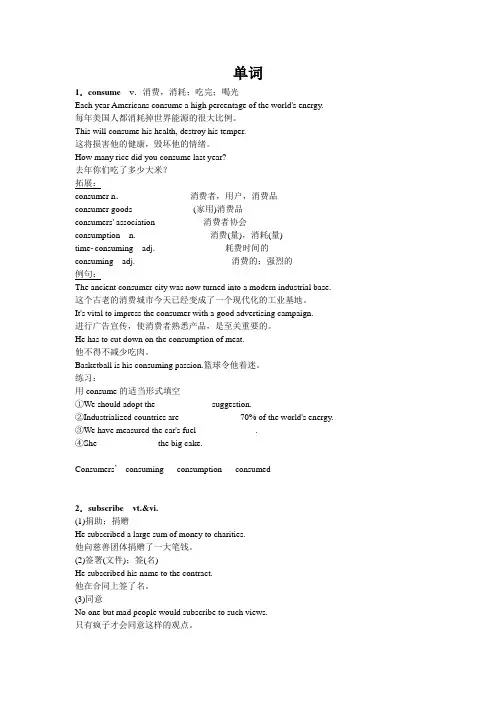
单词1.consume v.消费,消耗;吃完;喝光Each year Americans consume a high percentage of the world's energy.每年美国人都消耗掉世界能源的很大比例。
This will consume his health, destroy his temper.这将损害他的健康,毁坏他的情绪。
How many rice did you consume last year?去年你们吃了多少大米?拓展:consumer n.消费者,用户,消费品consumer goods (家用)消费品consumers' association 消费者协会consumption n. 消费(量),消耗(量)timeconsuming adj. 耗费时间的consuming adj. 消费的;强烈的例句:The ancient consumer city was now turned into a modern industrial base. 这个古老的消费城市今天已经变成了一个现代化的工业基地。
It's vital to impress the consumer with a good advertising campaign.进行广告宣传,使消费者熟悉产品,是至关重要的。
He has to cut down on the consumption of meat.他不得不减少吃肉。
Basketball is his consuming passion.篮球令他着迷。
练习:用consume的适当形式填空①We should adopt the ____________ suggestion.②Industrialized countries are _____________ 70% of the world's energy.③We have measured the car's fuel _____________.④She _____________ the big cake.Consumers’consuming consumption consumed2.subscribe vt.&vi.(1)捐助;捐赠He subscribed a large sum of money to charities.他向慈善团体捐赠了一大笔钱。
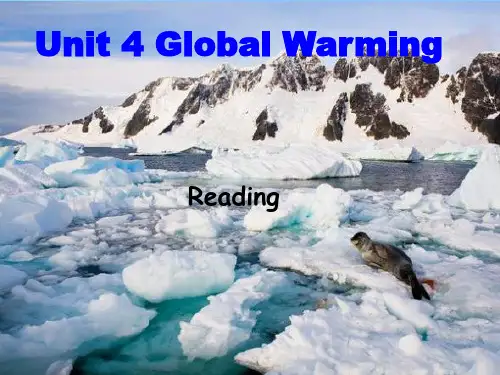

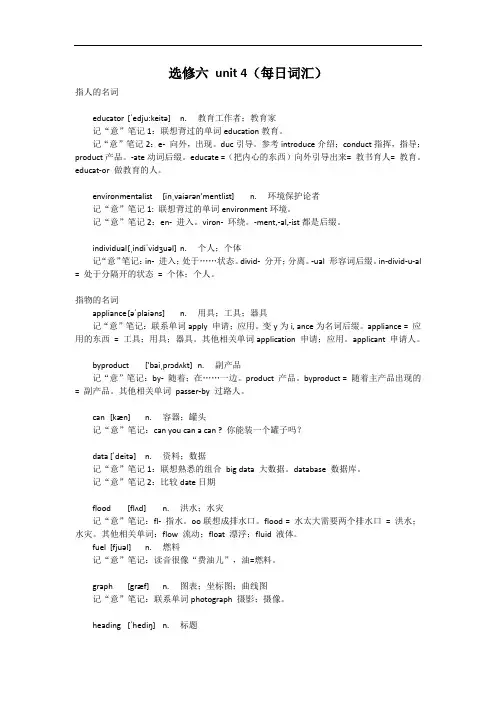
选修六unit 4(每日词汇)指人的名词educator[ˈedju:keitə]n.教育工作者;教育家记“意”笔记1:联想背过的单词education教育。
记“意”笔记2:e-向外,出现。
duc引导。
参考introduce介绍;conduct指挥,指导;product产品。
-ate动词后缀。
educate =(把内心的东西)向外引导出来= 教书育人= 教育。
educat-or 做教育的人。
environmentalist[inˌvaiərən'mentlist]n.环境保护论者记“意”笔记1: 联想背过的单词environment环境。
记“意”笔记2:en-进入。
viron-环绕。
-ment,-al,-ist都是后缀。
individual[ˌindiˈvidʒuəl]n.个人;个体记“意”笔记:in-进入;处于……状态。
divid-分开;分离。
-ual 形容词后缀。
in-divid-u-al = 处于分隔开的状态= 个体;个人。
指物的名词appliance[əˈplaiəns]n.用具;工具;器具记“意”笔记:联系单词apply 申请;应用。
变y为i, ance为名词后缀。
appliance = 应用的东西= 工具;用具;器具。
其他相关单词application 申请;应用。
applicant 申请人。
byproduct['baiˌprɔdʌkt]n.副产品记“意”笔记:by-随着;在……一边。
product 产品。
byproduct = 随着主产品出现的= 副产品。
其他相关单词passer-by 过路人。
can[kæn]n.容器;罐头记“意”笔记:can you can a can ? 你能装一个罐子吗?data[ˈdeitə]n.资料;数据记“意”笔记1:联想熟悉的组合big data 大数据。
database 数据库。
记“意”笔记2:比较date日期flood[flʌd]n.洪水;水灾记“意”笔记:fl-指水。

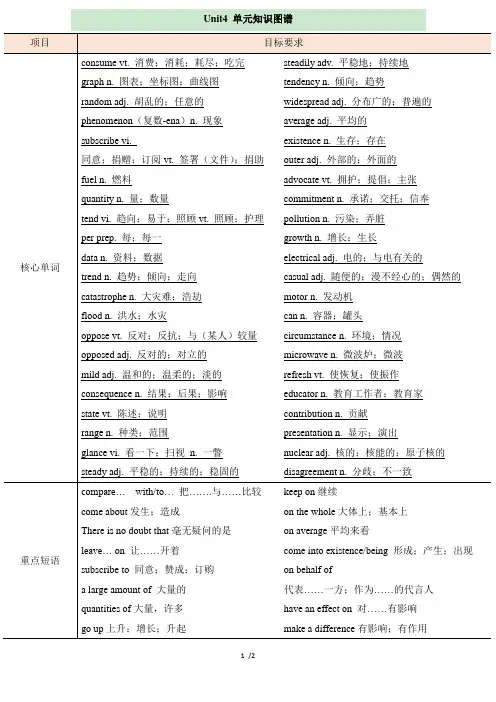
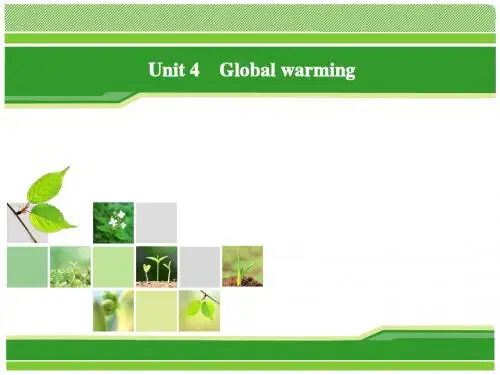
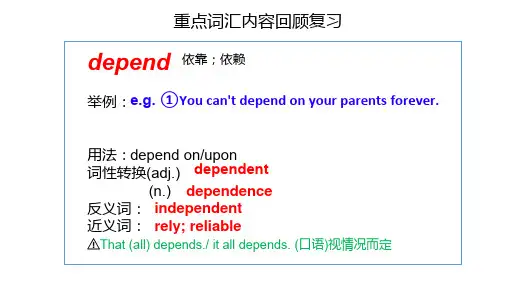
Unit4 阅读课名师教学设计Book 6 Unit 4 Global Warming What can we do about global warming?Reading & WritingTeaching objectives:1. Language and skillsStudents can predict the content of a letter in reply.Students can scan the passage and find out the specific information. Students can guess the meaning of the word according to the context.Students can understand when to use imperative sentences and the effect it creates. Students can design a slogan.Students can make a poster that tells various ways they can reduce the amount of carbon dioxide by using imperative sentences.2. Cultural awarenessStudents will be aware of the importance of reducing the amount of carbon dioxide and be an educator3. Learning strategiesStudents will cultivate their abilities by doing some activities independently and some in groups.Students will communicate with each other in English while doing the group work. Difficult points:To help the students to understand how they use the energy will affect the amount of global warming and think about what they can do about it.Teaching Aids:Picture display, slides, reading, discussion and writing.Teaching Procedures:1. lead-inShow a video of a baby polar bear being eaten by an adult bear to make students realize the environment has been changing because of the effect of global warming. Show a mind map to explain what causes global warming.2. readingStep 1Read the first letter and predict what the second letter is about.Step 2Skim for different views of the two letter on whether individuals have effect on environmental problems.Scan for suggestions and fill in the form.Guess what the word “count” mean according to the context.Step 3Explain the special effects the imperative sentences create and when to use them. Learn how to put forward a slogan.Step 4Show some examples and discuss whether it helps to reduce the amount of carbon dioxide.3. writingShow a video of a student’s daily life to see if there is anything he can do to reduce the amount of carbon dioxide.Group task: make a poster with your group members for your class that tells students various ways they can reduce the amount of carbon dioxide in the air. Remember to use imperative sentences in your poster.4. homeworkWriter a passage on what individuals can do about global warming.。
THE EARTH IS BECOMING WARMER-BUT DOES IT MATTER?During the 20th century the temperature of the earth rose about one degree Fahrenheit. That probably does not seem much to you or me, but it is a rapid increase when compared to other natural changes. So how has this come about and does it matter? Ea rth Care’s Sophie Armstrong explores these questions.There is no doubt that the earth is becoming warmer (see Graph 1) and that it is human activitythat has caused this global warming rather than a random but natural phenomenon.All scientists subscribe to the view that the increase in the earth's temperature is due to the burning of fossil fuels like coal, natural gas and oil to produce energy. Some byproducts of this process are called "greenhouse" gases, the most important one of which is carbon dioxide. Dr Janice Foster explains: "There is a natural phenomenon that scientists call the 'greenhouse effect'. This is when small amounts of gases in the atmosphere, like carbon dioxide, methane and water vapour, trap heat from the sun and therefore warm the earth. Without the 'greenhouse effect', the earth would be about thirty-three degrees Celsius cooler than it is. So, we need those gases. The problem begins when we add huge quantities of extra carbon dioxide into the atmosphere. It means that more heat energy tends to be trapped in the atmosphere causing the global temperature to go up."We know that the levels of carbon dioxide have increased greatly over the last 100 to 150 years. It was a scientist called Charles Keeling, who made accuratemeasurements of the amount of carbon dioxide in the atmosphere from 1957 to 1997. He found that between these years the carbon dioxide in the atmosphere went up from around 315 parts to around 370 parts per million(see Graph 2).All scientists accept this data. They also agree that it is the burning of more and more fossilfuels that has resulted in this increase in carbon dioxide. So how high will the temperature increase go? Dr Janice Foster says that over the next 100 years the amount of warming could be as low as 1 to 1.5 degrees Celsius, but it could be as high as 5 degrees.However, the attitude of scientists towards this rise is completely different. On the one hand, Dr Foster thinks that the trend which increases the temperature by 5 degrees would be a catastrophe. She says, "We can't predict the climate well enough to know what to expect, but it could be very serious." Others who agree with her think there may be a rise of several metres in the sea level, or predict severe storms, floods, droughts, famines, the spread of diseases and the disappearance of species. On the other hand, there are those, like George Hambley, who are opposed to this view, believe that we should not worry about high levels of carbon dioxide in the air. They predict that any warming will be mild with few bad environmental consequences. In fact, Hambley states, "More carbon dioxide is actually a positive thing. It will make plants grow quicker; crops will produce more; it will encourage a greater range of animals - all of which will make life for human beings better."Greenhouse gases continue to build up in the atmosphere. Even if we start reducing the amount of carbon dioxide and other greenhouse gases, the climate is going to keep on warming for decades or centuries. No one knows the effects of global warming. Does that mean we should do nothing? Or, are the risks too great? WHAT CAN WE DO ABOUT GLOBAL WARMING?Dear Earth Care,I am doing a project on behalf of my school about global warming. Sometimes I feel that individuals can have little effect on such huge environmental problems. However, 1 still think people should advocate improvements in the way we use energy today. As I'm not sure where to start with my project, I would appreciate any suggestions you may have.Thank you!Ouyang GuangDear Ouyang Guang,There are many people who have a commitment like yours, but they do not believe they have the power to do anything to improve our environment. That is not true. Together, individuals can make a difference. We do not have to put up with pollution. The growth of the greenhouse gas, carbon dioxide in the air actually comes as a result of many things we do every day. Here are a few suggestions on how to reduce it. They should get you started with your project.1 We use a lot of energy in our houses. It is OK to leave an electrical appliance on so long as you are using it - if not, turn it off! Do not be casual about this. So if you are not using the lights, the TV, the computer, and so on, turn them off. If you are cold, put on more clothes instead of turning up the heat.2 Motor vehicles use a lot of energy- so walk or ride a bike if you can.3 Recycle cans, bottles, plastic bags and newspapers if circumstances allow you to. It takes a lot of energy to make things from new materials, so, if you can, buy things made from recycled materials.4 Get your parents to buy things that are economical with energy - this includes cars as well as smaller things like fridges and microwaves.5 Plant trees in your garden or your school yard, as they absorb carbon dioxide from the air and refresh your spirit when you look at them.6 Finally and most importantly, be an educator. Talk with your family and friends about global warming and tell them what you have learned.Remember - your contribution counts! Earth Care。
Unit4 写作课名师教学设计Module 6 Unit 4 Using Language--Writing教学设计1. 学情分析Learning situation:In BOOK6 UNIT4, although students have already learned some knowledge about global warming in the previous reading part, they still have some difficulties in expressing ideas on how to reduce global warming in their daily life. Besides, for the writing task, students have known something about how to write a letter of advice, but most of them still don’t know the structure of it clearly, which may cause some confusion in their writing. So they need more guidance and some proper help on how to give suggestions on such big a social problem--how to reduce global warming.2 重点难点Difficult points and important points:Students may have difficulty analyzing which key information should be included in the letter and how to make use of some good sentence-patterns of suggestions. So students may have difficulty using their own words for the output part.3 教学过程3.1 第一学时3.1.1教学目标Teaching goals:1. Language competences: Students will be able to(1)learn some new words in situations: global warming, carbon dioxide, the rise of the sea level, cause, make a difference, count.(2)learn the structure of a letter of advice.(3)learn how to express themselves by using proper sentence-patterns of suggestions.2. Learning competence:The class is based on the students-centered principle, so every student is encouraged to participate in all the steps of writing. The teacher is just a guide, who will adopt some skills to get students to think about one question in the whole class---how canwe write a letter of advice on a social problem well? After all these activities, students will be able to exchange their ideas and learn how to organize a letter of advice.3. Cognitive competence:Students will be able to think about the structure of this kind of letter critically and they will form a right attitude towards the problem of global warming, which will exert some positive effects in their daily life.4.1.2 学时重点与难点Difficult points and important points:Students may have difficulty in analyzing the key information before writing and failing to adopt some good ways to express their opinions.4.1.3 教学活动活动1【导入】Greetings&Lead inEnjoy a short video1. What is the video about? Global warming2. What are the main causes of global warming?It is human activities that have caused global warming, for example, human beings are putting too much carbon dioxide into the air and many people are still cutting down trees in the forests.As we have seen in this video, global warming has caused many disasters in the world. It has become so serious a problem that many people around the world are concerned about it. Are you concerned about it? What can we do to help? We may do some small things to call on more people to take action, for example, we can finish a task like this.【设计说明】: 在Greetings的环节明确本节课教学目标,本节课我们要学习写一封信。